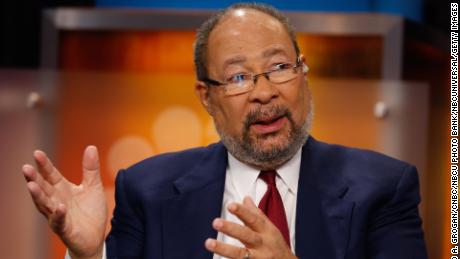
Dick Parsons: Georgia law is a bald-faced attempt to suppress Black vote
New York (CNN Business)Progressive activists are calling on Ford, Target, Google, Bank of America and other major companies that have pledged to support voting rights to cut ties with the US Chamber of Commerce, CNN Business has learned.
At issue is the Chamber of Commerce’s fierce opposition to the Democrats’ sweeping voting bill known as the For the People Act, which advocates say would counter efforts by Georgia and other states to impose new voting restrictions.
If they truly believe in protecting one of our most fundamental constitutional rights, they have no choice but to cut ties with the Chamber."
Kyle Herrig, president of Accountable.US
The Chamber of Commerce has slammed the legislation, which last month was approved by the US House of Representatives, as “extremely problematic” in part because of new curbs on political advocacy by companies and associations.
The Chamber is one of the most powerful trade groups in the nation. In 2020 alone, organization spent $81.9 million trying to influence government policy, according to the Center for Responsive Politics. The only organization that spent more was the National Association of Realtors.
Accountable.US, a progressive watchdog group, sent letters Wednesday to 25 companies that have a relationship with the Chamber of Commerce even though they signed last week’s statement in the New York Times vowing to oppose discriminatory voting legislation.
The campaign from activists underscores the enormous pressure companies are under to follow up their verbal support for voting rights with concrete action.
“By ignoring the Chamber’s opposition to a bill that protects an essential right in our democracy, these executives are violating their commitment and siding against the millions of Americans — including many of their own employees — fighting racist voter suppression tactics,” Kyle Herrig, president of Accountable.US, told CNN Business.
‘Serious risk’ to brand reputations
Letters were sent 17 companies that Accountable.US says are official Chamber of Commerce members, including Target, BlackRock (BLK), Citigroup, Google, Microsoft (MSFT), American Airlines (AAL), IBM (IBM) and Merck (MRK), whose CEO Ken Frazier has helped lead a campaign among Black executives to oppose restrictive voting legislation.
“By continuing to provide financial and social support to the Chamber, Target is contradicting the pledge you, and hundreds of other corporations, recently made,” Accountable.US wrote in a letter calling on Target (TGT) CEO Brian Cornell to renounce the company’s membership.
The group warned that supporting the Chamber of Commerce “poses a serious risk to Target’s reputation.”
A separate letter sent to Google CEO Sundar Pichai argued “silence on this matter is tantamount to an endorsement of the Chamber’s decision and shows where Google stands on protecting an individual’s right to vote.”
Accountable.US sent letters to another eight companies whose executives sit on the Chamber of Commerce’s board or have been featured on the Chamber’s foundation website.
“If they truly believe in protecting one of our most fundamental constitutional rights, they have no choice but to cut ties with the Chamber,” Herrig said.
In a statement to CNN Business, a spokesperson for the Chamber of Commerce called the campaign by Accountable.US a “misrepresentation” of what the organization has said. The spokesperson emphasized that the Chamber of Commerce is deeply troubled by efforts to change election law on a partisan basis because that can erode confidence in election outcomes.
“Our elected leaders, Democrat and Republican need to find common grown when making changes to election laws. We need consensus not division on important issues,” the Chamber of Commerce said.
Most of the companies did not respond to requests for comment. Citi and Google declined to comment.
Chamber of Commerce says bill would ‘silence’ some Americans
Companies frequently take different positions than that of trade associations they belong to.
“We work with many coalitions, trade groups, and industry associations on a broad range of topics,” Ford said in a statement. “When it comes to voting rights, Ford’s position is clear: We believe that equitable access to voting rights for all people is the bedrock of a democratic society.”
Google recently threw its weight behind the John Lewis Voting Rights Act, a separate bill backed by Democrats that would restore a key part of the historic Voting Rights Act that was struck down by the Supreme Court in 2013.
“We’re concerned about efforts to restrict voting at a local level and we strongly support the John Lewis Voting Rights Advancement Act,” Kent Walker, Google’s senior vice president of global affairs, said in a tweet late last month.
Last week, the Chamber of Commerce sent a “key vote alert” to senators to detailing why it “strongly opposes” the For the People Act and warning that it could include votes related to the bill in its annual scorecard.
The Chamber of Commerce argued changes to election law should be done on a bipartisan basis and said the Democrat bill would push “certain voices, representing large segments of the electorate and US economy, out of the political process altogether.”
The Chamber took particular issue with new restrictions on communications by associations. The bill “would regulate and ultimately silence Americans who choose to petition their government or participate in the political process through the collective action of an association or corporation,” the Chamber of Commerce’s key vote letter said.
Boycott threats — from both sides
CEOs face a difficult balancing act in standing up for democracy without alienating customers or sparking a backlash from politicians and regulators.
Hundreds of companies signed onto last week’s full-page ad in the NY Times pledging to oppose “any discriminatory legislation or measures that restrict or prevent any eligible voter from having an equal and fair opportunity to cast a ballot.”
After Major League Baseball, Delta Air Lines (DAL) and others voiced opposition to Georgia’s controversial law, former President Donald Trump called for a boycott of these brands. Senate Minority Leader Mitch McConnell warned the companies “will invite serious consequences if they become a vehicle for far-left mobs.”
Lawmakers in Georgia threatened to revoke tax breaks benefiting Delta after CEO Ed Bastian blasted the state’s election law.
At the same time, companies that have taken a more cautious approach towards speaking out about voting rights are under pressure.
Faith leaders in Georgia called for a boycott this week of Home Depot (HD) because the Atlanta-based company has not publicly opposed the state’s election law. That boycott could expand to Chick-Fil-A and Arby’s.
Reid Hoffman, LinkedIn’s co-founder, is calling on business leaders to back up their verbal support for voting rights by cutting off funding for politicians who seek to limit voting rights
“This is an important moment in history,” Hoffman told CNN Business in an email. “It may be a longer battle than it ought to be, but I do know what side of the fight, as a patriotic American citizen — and as a businessperson — that I want to be on.”
Source: Read Full Article

